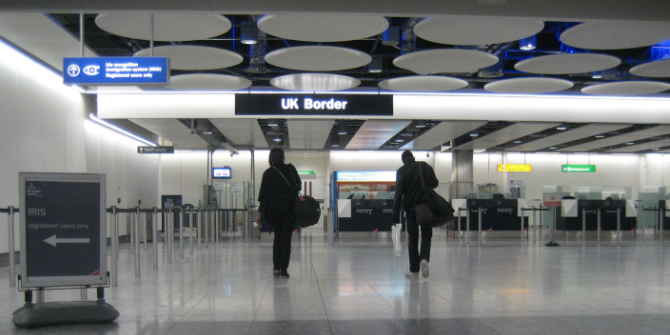 Who is a family member? This question is at the heart of the ambiguities surrounding the UK’s offer to EU citizens post-Brexit, writes Katya Ivanova (LSE). The proposal seeks to align the rules governing family unification for EU citizens with those currently applied to non-EU citizens. It also seeks to bring EU citizens under the control of the UK legal system and prevent them from going to the Court of Justice of the EU. In its current form, it would probably lead to numerous family break-ups.
Who is a family member? This question is at the heart of the ambiguities surrounding the UK’s offer to EU citizens post-Brexit, writes Katya Ivanova (LSE). The proposal seeks to align the rules governing family unification for EU citizens with those currently applied to non-EU citizens. It also seeks to bring EU citizens under the control of the UK legal system and prevent them from going to the Court of Justice of the EU. In its current form, it would probably lead to numerous family break-ups.
Anxious and apprehensive, EU citizens residing in the UK generally responded to the government’s overdue offer on their status and rights post-Brexit with dismay and criticism. Three key areas of the proposal – a new registration system for qualified EU citizens wishing to gain permanent residency, a limited family unification package and the UK’s insistence that any deal be enforced domestically rather than at the Court of Justice of the EU (CJEU) – was a clear departure from the Conservatives’ promise that ‘nothing will change for EU citizens living in the UK’.
Under the British deal, the UK plans to institute a new registration system for EU citizens who have been living in the UK pre-Brexit. Despite a few promising signs, such as the abandonment of the controversial comprehensive sickness insurance requirement and a commitment to keep the new system as smooth and as simple as possible, the proposal is rife with ambiguity. What will the new requirements for permanent settled status entail? What will the cut-off date delineating pre- and post-Brexit EU arrivals be? How much will registration cost? How competently, consistently and fairly would the domestic courts enforce and protect these new rights? The vagueness of the proposal has heightened the insecurity felt by EU citizens and deepened their mistrust of the government.

The official UK position on the rights of EU citizens living in the UK
Judging by the UK proposal, family unification rights post-Brexit is the area in which the promise to keep things unchanged for EU citizens is fundamentally broken. As we explained in an earlier post, the UK has decided to go for a compromise: family members of EU citizens already in the UK, and those who arrive before the UK leaves, will continue to enjoy the benefits granted under EU freedom of movement law.
This involves some policy flexibility – that is, conceding more generous rights to EU than to other non-EU migrants. This would allow EU citizens already living in the UK to make plans for reunification in the expectation that the rules applying to them will differ from the present freedom of movement law. It aims to limit family reunification rights, but not reduce them to those of non-EU citizens in the UK.
One scenario we described was that EU citizens would have received “exceptional” treatment, and their current rights and protections under EU freedom of movement law would have remained unchanged and guaranteed in perpetuity. This is the EU’s opening negotiation position, and one which the UK government finds unacceptable for now. This scenario is problematic, as Joris Luyendijk writes:
‘If EU nationals kept all their rights post-Brexit they would end up with more rights than the local population, and find themselves under protection of a foreign court – first-class citizens in a country not their own.’
The superior treatment of EU nationals would have highlighted the harsh reality of UK’s immigration law towards its own citizens who seek unification with non-EU family. This option, which would allow the unrestricted entry of family members to EU citizens settled in the UK post-Brexit, is also politically unfeasible given that one of the main drivers of the referendum was to restrict EU migration.
Another scenario we envisaged – the UK’s adoption of EU law for all – was ideal, and as such desirable, but the least politically feasible. Given the domestic political situation it is unlikely that the EU freedom of movement and settlement would stay unchanged, even if this option is in both the EU’s and UK’s interests and chimes with the labour needs of a globalised world.
Under the ‘compromise scenario’ we discussed, the family members of EU citizens can continue to join them in the UK without restrictions until Brexit day. Those members who join later, however, will be subject to the same rules as those joining British citizens, or possibly subject to the same restrictions as EU citizens arriving after the cut-off date.
Especially concerning is the lack of clarity in the British offer as to who will be considered a family member in the post-Brexit world. Under EU free movement law, the definition of a family member is significantly wider than it is in the UK. Spouses, civil partners, partners in a long-term relationship and children under the age of 21 are considered family members. It also makes provisions for family unification for the parents and grandparents of the EU national or their family members, children over 21 and other family members including siblings, cousins, aunts and uncles. Therefore, both direct and extended family members have the right to family unification if they can provide satisfactory and valid proof of the relationship. The UK immigration rules limit the right to unification to two categories of direct family members: a spouse/civil partner, and children under 18. Other direct dependent relatives like grandparents, brothers, sisters and children over 18 may also apply for unification but only if they require long-term personal care due to sickness, disability or age, and if the care they need is not available or affordable in their country.
In practice, if the family unification rules for EU citizens post-Brexit are aligned with domestic rules, the change will lead to family break-ups despite Theresa May’s promise that ‘no families will be split up’. The UK definition excludes adult children and family members, except for the sick and elderly. It will no longer be possible for healthy adult children to join their parents, and vice versa, preventing even those ordinarily considered direct family from enjoying family life together.
Furthermore, the UK unification system is notoriously difficult to comply with for those who legally have the right to join a family member in the UK. The minimum income threshold routinely prevents lower income spouses from qualifying. Others find it impossible to prove that the care they need for sick or elderly relatives is not available or affordable in their home country. The requirements are pernicious, because they do not take into consideration the individual circumstances of the person, their family needs and their wellbeing. Instead the UK immigration system is designed to prevent less desirable groups of people (such as the economically inactive and lower-skilled) from qualifying. It takes away the ability of the immigrant to make family-related choices and hands it to a government which frames its desire for control over immigration exclusively in terms of the social and economic national self-interest, with no visible regard for the immigrant’s wellbeing. As such, domestic immigration law, which the UK government wants to impose on EU citizens, breaches the fundamental right to enjoy family life.
The UK offer falls short of the EU proposal and, in this sense, is neither generous nor fair to EU citizens. Still, the proposal undeniably has its merits – it provides a pathway to a settled status and eventually to citizenship for EU nationals living in the UK pre-Brexit. It also makes provisions for continued access to social security benefits and healthcare. Also of significance is the language of the proposal: it presents EU citizens in an overwhelmingly positive light, framing them as valued members of their communities and as integral to British society. It commits the UK government to equal treatment of all EU citizens in the UK irrespective of their nationality (with the exception of Irish citizens) and effectively aims at giving EU citizens to the same rights as UK citizens have. The proposal is devoid of nationalistic aspirations to put British nationals first and relegate EU residents to second-class citizens.
In its current form, the offer represents a moderate scaling-back of the rights EU citizens in the UK enjoy. We shall see whether the UK government will seek to bring its proposal closer to the EU offer, or will end up limiting these rights further.
This post represents the views of the authors and not those of the Brexit blog, nor the LSE.
Dr Katya Ivanova received her PhD from LSE’s European Institute. Her interests include human rights, minority rights and social inclusion. Her recent work examines state compliance with international human rights legal standards.
Georgiana Turculet, a PhD candidate at the Doctoral School of Political Science, Public Policy and International Relations of Central European University, contributed to this piece. Her research interest focuses on migration, citizenship, and democracy, particularly concerning the issues raised by the movement of people across state borders.
Breaking up families is easy to do: family reunification post-Brexit







I’m confused, maybe someone can clarify this for me. This article mentions the abandonment of the Comprehensive Sickness Insurance requirement, but the EEA guidance notes still mention that this is mandatory for students applying for permanent residency.
The article talks about the UK government’s plans for a future “Settled Status” for EU/EEA citizens who arrived in the UK before Brexit. The EEA guidance notes are about the currently existing Permanent Residence status. For that CSI remains necessary. However, I would suspect that some form of Settled Status will be introduced (whether more like the UK’s proposal or the EU’s proposal) and so there is not much reason for anyone to apply for PR while it still requires CSI and so you’re better off waiting. Two exceptions: 1. I would hope they will make it easy to transform your PR document into Settled Status. 2. If you want to become a UK citizen as soon as possible, you’ll need the PR document now in order to be eligible.
It seems that having CSI in the past will not be a requirement for APPLYING for settled status, but that it will still be necessary for ‘economically inactive’ people to get CSI after they get settled status. The relevant Government document says “In some circumstances, comprehensive sickness insurance is still required for the purposes of accessing the healthcare system in the UK, but will no longer be considered as a requirement for acquiring settled status.” and this seems to imply that some, eg ‘stay at home mothers’ and others who are regarded as economically inactive, will still need CSI after Brexit. In my case, my french wife and I (I’m a UK national) live on my pension income – she does not have a pension. I’m sure therefore that she will need CSI, though at £120 per month it seems unaffordable.